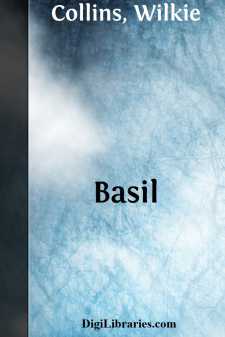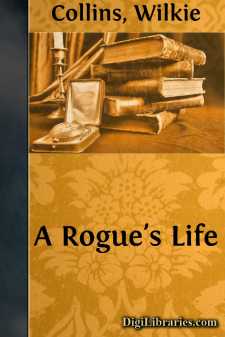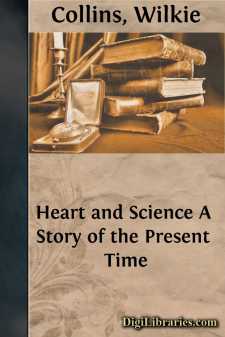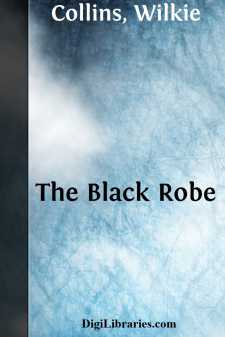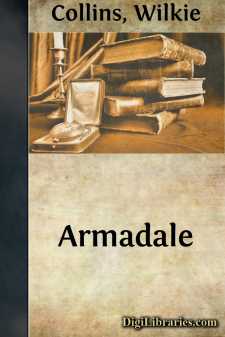Categories
- Antiques & Collectibles 13
- Architecture 36
- Art 48
- Bibles 22
- Biography & Autobiography 813
- Body, Mind & Spirit 142
- Business & Economics 28
- Children's Books 17
- Children's Fiction 14
- Computers 4
- Cooking 94
- Crafts & Hobbies 4
- Drama 346
- Education 46
- Family & Relationships 57
- Fiction 11829
- Games 19
- Gardening 17
- Health & Fitness 34
- History 1377
- House & Home 1
- Humor 147
- Juvenile Fiction 1873
- Juvenile Nonfiction 202
- Language Arts & Disciplines 88
- Law 16
- Literary Collections 686
- Literary Criticism 179
- Mathematics 13
- Medical 41
- Music 40
- Nature 179
- Non-Classifiable 1768
- Performing Arts 7
- Periodicals 1453
- Philosophy 64
- Photography 2
- Poetry 896
- Political Science 203
- Psychology 42
- Reference 154
- Religion 513
- Science 126
- Self-Help 84
- Social Science 81
- Sports & Recreation 34
- Study Aids 3
- Technology & Engineering 59
- Transportation 23
- Travel 463
- True Crime 29
Basil
by: Wilkie Collins
Categories:
Description:
Excerpt
IT has long been one of my pleasantest anticipations to look forward to the time when I might offer to you, my old and dear friend, some such acknowledgment of the value I place on your affection for me, and of my grateful sense of the many acts of kindness by which that affection has been proved, as I now gladly offer in this place. In dedicating the present work to you, I fulfil therefore a purpose which, for some time past, I have sincerely desired to achieve; and, more than that, I gain for myself the satisfaction of knowing that there is one page, at least, of my book, on which I shall always look with unalloyed pleasure—the page that bears your name.
I have founded the main event out of which this story springs, on a fact within my own knowledge. In afterwards shaping the course of the narrative thus suggested, I have guided it, as often as I could, where I knew by my own experience, or by experience related to me by others, that it would touch on something real and true in its progress. My idea was, that the more of the Actual I could garner up as a text to speak from, the more certain I might feel of the genuineness and value of the Ideal which was sure to spring out of it. Fancy and Imagination, Grace and Beauty, all those qualities which are to the work of Art what scent and colour are to the flower, can only grow towards heaven by taking root in earth. Is not the noblest poetry of prose fiction the poetry of every-day truth?
Directing my characters and my story, then, towards the light of Reality wherever I could find it, I have not hesitated to violate some of the conventionalities of sentimental fiction. For instance, the first love-meeting of two of the personages in this book, occurs (where the real love-meeting from which it is drawn, occurred) in the very last place and under the very last circumstances which the artifices of sentimental writing would sanction. Will my lovers excite ridicule instead of interest, because I have truly represented them as seeing each other where hundreds of other lovers have first seen each other, as hundreds of people will readily admit when they read the passage to which I refer? I am sanguine enough to think not.
So again, in certain parts of this book where I have attempted to excite the suspense or pity of the reader, I have admitted as perfectly fit accessories to the scene the most ordinary street-sounds that could be heard, and the most ordinary street-events that could occur, at the time and in the place represented—believing that by adding to truth, they were adding to tragedy—adding by all the force of fair contrast—adding as no artifices of mere writing possibly could add, let them be ever so cunningly introduced by ever so crafty a hand.
Allow me to dwell a moment longer on the story which these pages contain.
Believing that the Novel and the Play are twin-sisters in the family of Fiction; that the one is a drama narrated, as the other is a drama acted; and that all the strong and deep emotions which the Play-writer is privileged to excite, the Novel-writer is privileged to excite also, I have not thought it either politic or necessary, while adhering to realities, to adhere to every-day realities only. In other words, I have not stooped so low as to assure myself of the reader's belief in the probability of my story, by never once calling on him for the exercise of his faith. Those extraordinary accidents and events which happen to few men, seemed to me to be as legitimate materials for fiction to work with—when there was a good object in using them—as the ordinary accidents and events which may, and do, happen to us all. By appealing to genuine sources of interest within the reader's own experience, I could certainly gain his attention to begin with; but it would be only by appealing to other sources (as genuine in their way) beyond his own experience, that I could hope to fix his interest and excite his suspense, to occupy his deeper feelings, or to stir his nobler thoughts....


